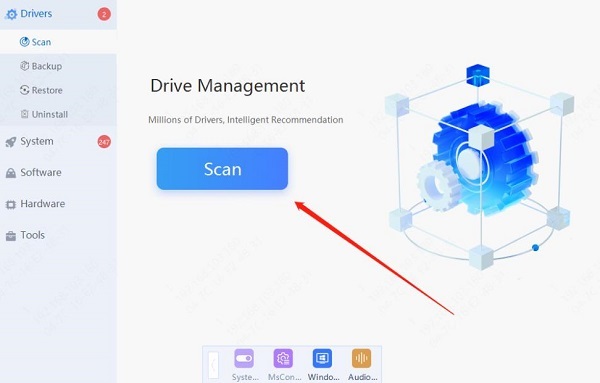
In daily computer use, you might sometimes face a situation where the speaker shows volume but no sound. This article offers solutions to help you quickly restore audio playback.
1. Check Speaker Connections
For wired speakers, ensure the audio cable is plugged into the correct audio output port (green jack). Unplug and reinsert the audio cable to secure the connection.
For Bluetooth speakers, check the device is paired and selected as the audio output. Ensure external speakers are powered on, and the power indicator light is on.
2. Update Audio Drivers
Outdated or corrupted audio drivers can cause abnormal audio output. It is recommended to use Driver Sentry to automatically detect and update drivers, saving time and avoiding downloading or installing incorrect drivers.
Click the download button to get the latest version of Driver Sentry, install it, and open the software. Click "Scan".

After scanning, it will show which drivers need installation or updates. Find the audio driver in the results list and click the "Update" button.
After updating, it is recommended to restart your computer to ensure the updated driver functions correctly.
3. Check Volume Settings
Right-click the volume icon in the lower right corner of the taskbar and open the volume control panel. Ensure the volume slider is turned up and not muted.
Open the audio playback software you are using and check its internal volume settings to ensure it is not lowered or muted.
Right-click the volume icon and select "Volume Mixer". Check the volume settings for individual applications to ensure they are not muted.

4. Check Audio Output Device Settings
Right-click the volume icon in the taskbar and select "Sound Settings".
Under the "Output" section, ensure the correct audio output device (such as speakers or headphones) is selected. If uncertain, try switching to another device.

Right-click the selected audio device and choose "Set as Default Device" to ensure the system sends audio output to that device.
5. Reinstall Audio Drivers
Press Windows + X and open "Device Manager".
Expand the "Sound, video and game controllers" section and locate your audio device.
Right-click the device and select "Uninstall Device", then confirm the uninstallation.

Restart the computer, and the system will automatically detect and reinstall the audio driver.
6. Run Audio Troubleshooter
Press Windows + I to open "Settings".
Go to "Update & Security" and click "Troubleshoot".
Under "Other Troubleshooters", find the "Playing Audio" option and click "Run the Troubleshooter".

Follow the on-screen instructions to complete the troubleshooting and see if the problem can be automatically fixed.
7. Check for Physical Hardware Issues
Connect the speakers to another computer or phone to verify if they work properly.
Check if the audio output port is dirty, damaged, or loose.
If you have another set of speakers, try switching to see if the issue persists.
8. Restore System Settings
Press Windows + R, type "rstrui", and press Enter.
In the System Restore window, select a restore point you believe to be stable and click "Next".

Follow the prompts to confirm the restore operation and wait for the system to complete the process.
After the restore is complete, restart your computer and check if the speakers are working properly.
By following these steps, you can systematically troubleshoot and resolve the issue of speakers having volume but no sound. If the problem persists, it is recommended to contact professional technical support.
See also:
7 Ways to Maximize GPU Performance
How to Fix Wireless Mouse Connection Failure